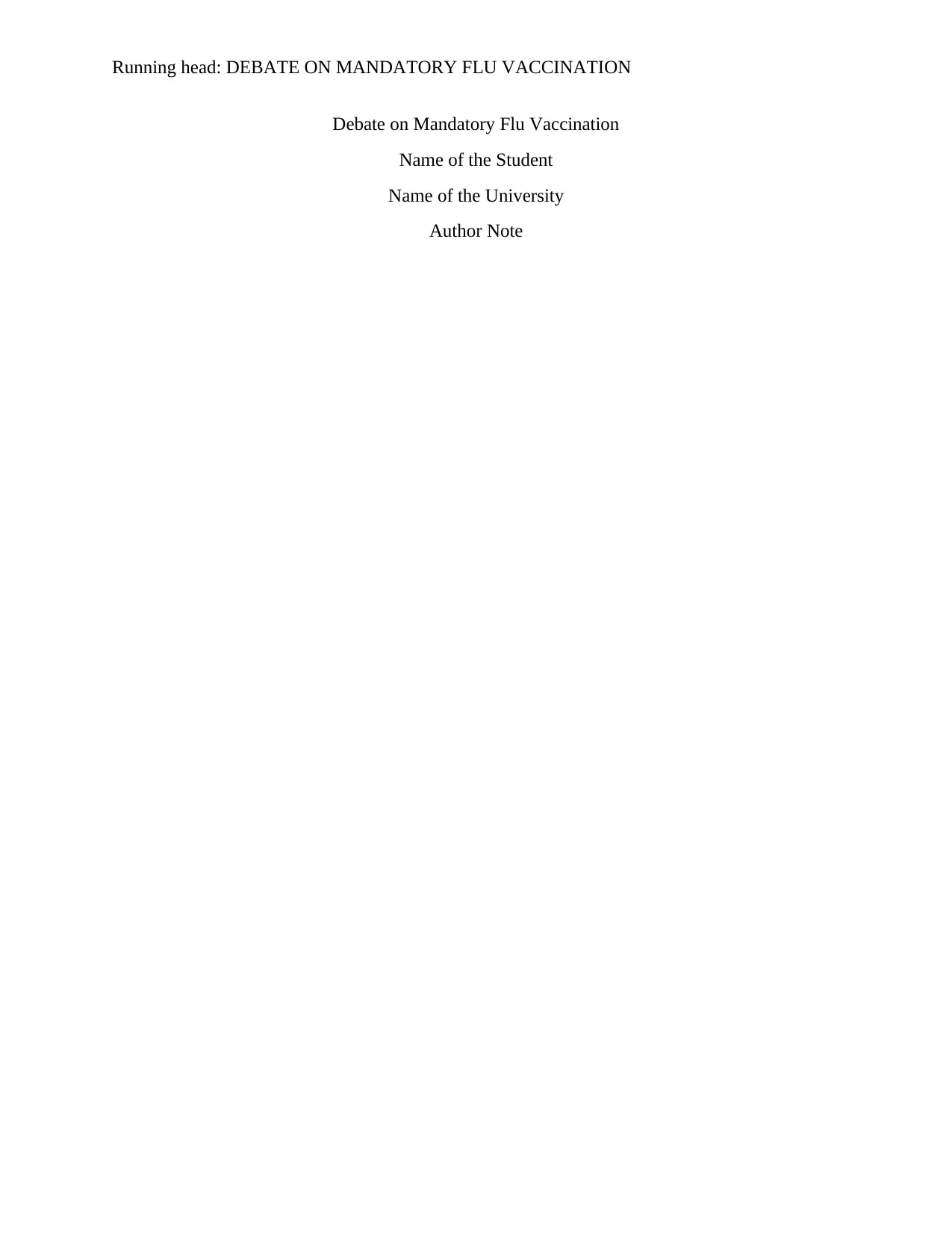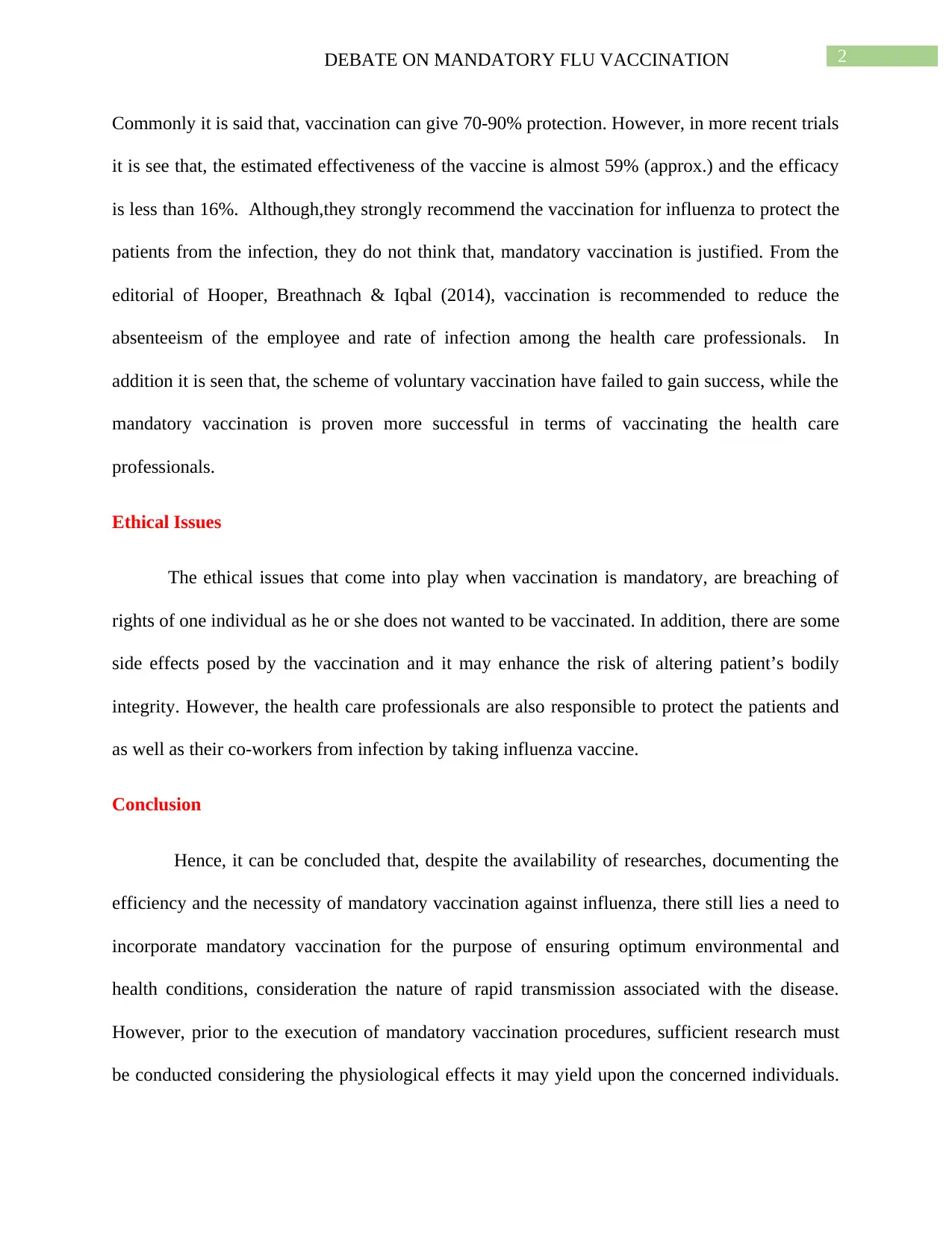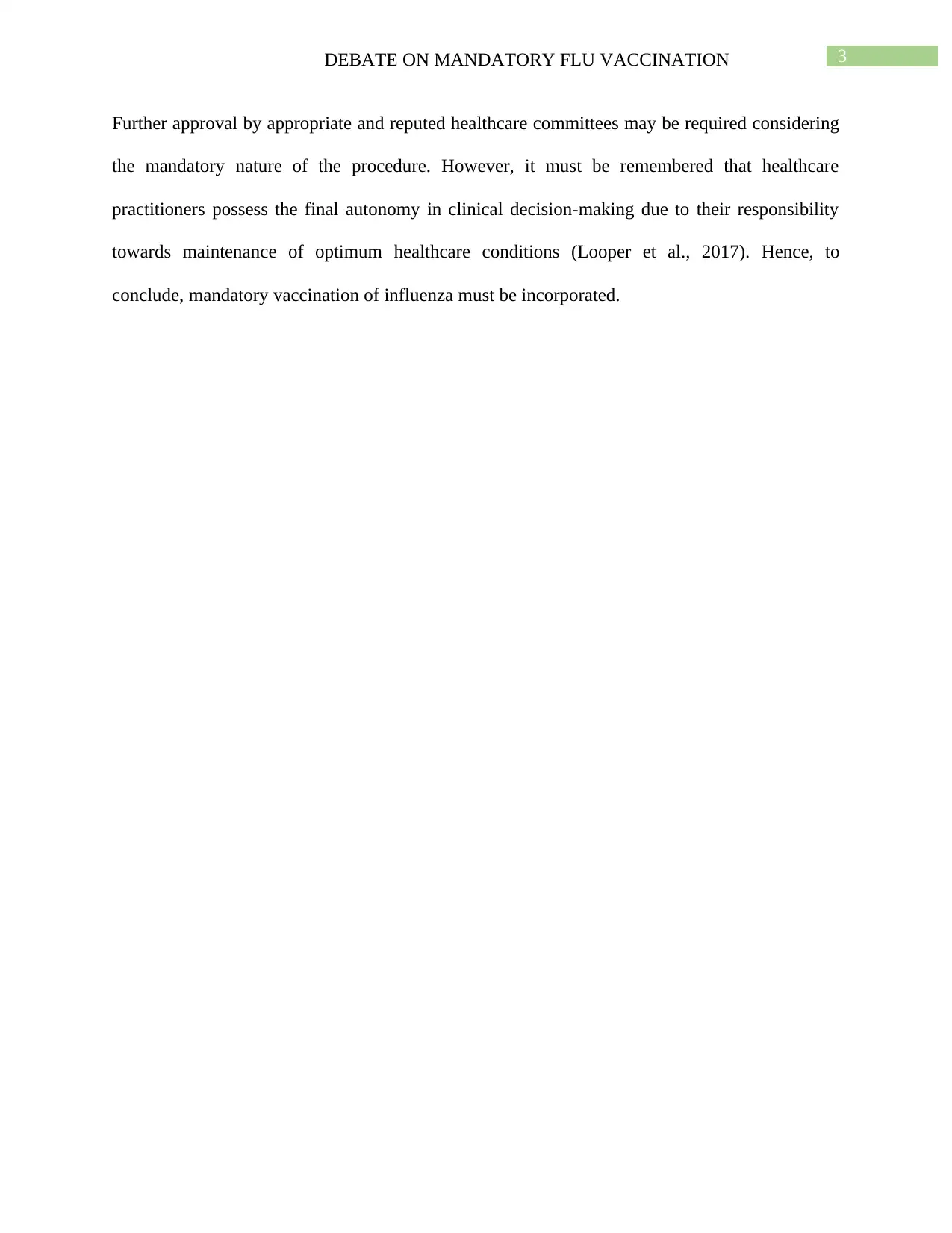Healthcare Ethics: Debate on Mandatory Flu Vaccination Policy
VerifiedAdded on 2023/05/30
|5
|939
|452
Essay
AI Summary
This essay delves into the contentious debate surrounding mandatory influenza vaccination for healthcare professionals. It begins by outlining the significance of the influenza virus and the role of vaccination in combating it. The paper presents arguments for and against mandatory vaccination, drawing upon various sources, including reports from U.S. News, and editorials. The discussion explores ethical considerations, such as patient safety, healthcare worker rights, and the effectiveness of the vaccine. It examines the potential conflicts between individual autonomy and the collective responsibility to protect patients from infection. The conclusion emphasizes the need for further research and ethical deliberation before implementing mandatory vaccination policies, considering both the benefits and potential drawbacks. References from sources like U.S. News, and other scholarly articles, are included to support the arguments presented.

Running head: DEBATE ON MANDATORY FLU VACCINATION
Debate on Mandatory Flu Vaccination
Name of the Student
Name of the University
Author Note
Debate on Mandatory Flu Vaccination
Name of the Student
Name of the University
Author Note
Paraphrase This Document
Need a fresh take? Get an instant paraphrase of this document with our AI Paraphraser

1DEBATE ON MANDATORY FLU VACCINATION
Introduction
Influenza virus is responsible for the common flue disease that is an infectious one.
Vaccination is the most convenient way of combatting against the virus. A vaccine can reduce
the chances of influenza disease by almost 90%. However that is dependent on various factors.
The centers for Disease Control and Prevention, Healthcare Infection Control Practices Advisory
Committee (HICPAC), the Advisory Committee on Immunization Practices (ACIP) suggest that,
all the health care professionals in US should be vaccinated against the virus every year.
However, the strategy of mandatory vaccination is still a matter of argument as this pits the
patient safety, health care professionals and also hampers the employee relations. The health care
administrators are planning to execute the mandatory influenza vaccination policy.
Discussion
According to a report of US News (2013) it was seen that, there are many other risk
factors with which Americans are fighting every day. The vaccination of the health care
professionals is only due to protect the patients from infection. One of the most important cause
of this controversy is that, people are unable to understand the risks of influenza infections. In
US, almost 5-20% of total population is affected by this infection and the rate is about 3000-
50,000 per year. Moreover, the mortality rate is higher than that of the mortality rate of AIDS.
Hospitals are very vulnerable place for those who are older and already very sick. That is the
reason the mandatory vaccination of the health care personnel is no-brainer. From the editorial of
Cheng & Worth (2014), it is seen that, they strongly recommend the vaccination to protect the
patients from influenza. However, the vaccination is neither enough nor necessary to prevent flu
and other respiratory virus infection among the patients. The influenza vaccine is not capable to
give complete protection and so that it can be said that mandatory vaccination is not necessary.
Introduction
Influenza virus is responsible for the common flue disease that is an infectious one.
Vaccination is the most convenient way of combatting against the virus. A vaccine can reduce
the chances of influenza disease by almost 90%. However that is dependent on various factors.
The centers for Disease Control and Prevention, Healthcare Infection Control Practices Advisory
Committee (HICPAC), the Advisory Committee on Immunization Practices (ACIP) suggest that,
all the health care professionals in US should be vaccinated against the virus every year.
However, the strategy of mandatory vaccination is still a matter of argument as this pits the
patient safety, health care professionals and also hampers the employee relations. The health care
administrators are planning to execute the mandatory influenza vaccination policy.
Discussion
According to a report of US News (2013) it was seen that, there are many other risk
factors with which Americans are fighting every day. The vaccination of the health care
professionals is only due to protect the patients from infection. One of the most important cause
of this controversy is that, people are unable to understand the risks of influenza infections. In
US, almost 5-20% of total population is affected by this infection and the rate is about 3000-
50,000 per year. Moreover, the mortality rate is higher than that of the mortality rate of AIDS.
Hospitals are very vulnerable place for those who are older and already very sick. That is the
reason the mandatory vaccination of the health care personnel is no-brainer. From the editorial of
Cheng & Worth (2014), it is seen that, they strongly recommend the vaccination to protect the
patients from influenza. However, the vaccination is neither enough nor necessary to prevent flu
and other respiratory virus infection among the patients. The influenza vaccine is not capable to
give complete protection and so that it can be said that mandatory vaccination is not necessary.

2DEBATE ON MANDATORY FLU VACCINATION
Commonly it is said that, vaccination can give 70-90% protection. However, in more recent trials
it is see that, the estimated effectiveness of the vaccine is almost 59% (approx.) and the efficacy
is less than 16%. Although,they strongly recommend the vaccination for influenza to protect the
patients from the infection, they do not think that, mandatory vaccination is justified. From the
editorial of Hooper, Breathnach & Iqbal (2014), vaccination is recommended to reduce the
absenteeism of the employee and rate of infection among the health care professionals. In
addition it is seen that, the scheme of voluntary vaccination have failed to gain success, while the
mandatory vaccination is proven more successful in terms of vaccinating the health care
professionals.
Ethical Issues
The ethical issues that come into play when vaccination is mandatory, are breaching of
rights of one individual as he or she does not wanted to be vaccinated. In addition, there are some
side effects posed by the vaccination and it may enhance the risk of altering patient’s bodily
integrity. However, the health care professionals are also responsible to protect the patients and
as well as their co-workers from infection by taking influenza vaccine.
Conclusion
Hence, it can be concluded that, despite the availability of researches, documenting the
efficiency and the necessity of mandatory vaccination against influenza, there still lies a need to
incorporate mandatory vaccination for the purpose of ensuring optimum environmental and
health conditions, consideration the nature of rapid transmission associated with the disease.
However, prior to the execution of mandatory vaccination procedures, sufficient research must
be conducted considering the physiological effects it may yield upon the concerned individuals.
Commonly it is said that, vaccination can give 70-90% protection. However, in more recent trials
it is see that, the estimated effectiveness of the vaccine is almost 59% (approx.) and the efficacy
is less than 16%. Although,they strongly recommend the vaccination for influenza to protect the
patients from the infection, they do not think that, mandatory vaccination is justified. From the
editorial of Hooper, Breathnach & Iqbal (2014), vaccination is recommended to reduce the
absenteeism of the employee and rate of infection among the health care professionals. In
addition it is seen that, the scheme of voluntary vaccination have failed to gain success, while the
mandatory vaccination is proven more successful in terms of vaccinating the health care
professionals.
Ethical Issues
The ethical issues that come into play when vaccination is mandatory, are breaching of
rights of one individual as he or she does not wanted to be vaccinated. In addition, there are some
side effects posed by the vaccination and it may enhance the risk of altering patient’s bodily
integrity. However, the health care professionals are also responsible to protect the patients and
as well as their co-workers from infection by taking influenza vaccine.
Conclusion
Hence, it can be concluded that, despite the availability of researches, documenting the
efficiency and the necessity of mandatory vaccination against influenza, there still lies a need to
incorporate mandatory vaccination for the purpose of ensuring optimum environmental and
health conditions, consideration the nature of rapid transmission associated with the disease.
However, prior to the execution of mandatory vaccination procedures, sufficient research must
be conducted considering the physiological effects it may yield upon the concerned individuals.
⊘ This is a preview!⊘
Do you want full access?
Subscribe today to unlock all pages.

Trusted by 1+ million students worldwide

3DEBATE ON MANDATORY FLU VACCINATION
Further approval by appropriate and reputed healthcare committees may be required considering
the mandatory nature of the procedure. However, it must be remembered that healthcare
practitioners possess the final autonomy in clinical decision-making due to their responsibility
towards maintenance of optimum healthcare conditions (Looper et al., 2017). Hence, to
conclude, mandatory vaccination of influenza must be incorporated.
Further approval by appropriate and reputed healthcare committees may be required considering
the mandatory nature of the procedure. However, it must be remembered that healthcare
practitioners possess the final autonomy in clinical decision-making due to their responsibility
towards maintenance of optimum healthcare conditions (Looper et al., 2017). Hence, to
conclude, mandatory vaccination of influenza must be incorporated.
Paraphrase This Document
Need a fresh take? Get an instant paraphrase of this document with our AI Paraphraser

4DEBATE ON MANDATORY FLU VACCINATION
References
Bloom, J. (2013, February 4). Mandate the flu vaccine for healthcare workers. U.S. News.
Retrieved from: http://www.usnews.com/opinion/articles/2013/02/04/mandate-flu-
vaccines-for-healthcare-workers.
Cheng, A. C., & Worth, L. J. (2014). Mandatory influenza vaccination of healthcare workers: is
it necessary or sufficient to protect patients?. Healthcare Infection, 19(3), 114-115.
Hooper, C. R., Breathnach, A., & Iqbal, R. (2014). Is there a case for mandating influenza
vaccination in healthcare workers?. Anaesthesia, 69(2), 95-100.
Looper, P., George, D., Johnson, E. J., & Conway, S. E. (2017). Student and faculty perceptions
about mandatory influenza vaccinations on a health sciences campus. Journal of
American College Health, 65(7), 513-517.
References
Bloom, J. (2013, February 4). Mandate the flu vaccine for healthcare workers. U.S. News.
Retrieved from: http://www.usnews.com/opinion/articles/2013/02/04/mandate-flu-
vaccines-for-healthcare-workers.
Cheng, A. C., & Worth, L. J. (2014). Mandatory influenza vaccination of healthcare workers: is
it necessary or sufficient to protect patients?. Healthcare Infection, 19(3), 114-115.
Hooper, C. R., Breathnach, A., & Iqbal, R. (2014). Is there a case for mandating influenza
vaccination in healthcare workers?. Anaesthesia, 69(2), 95-100.
Looper, P., George, D., Johnson, E. J., & Conway, S. E. (2017). Student and faculty perceptions
about mandatory influenza vaccinations on a health sciences campus. Journal of
American College Health, 65(7), 513-517.
1 out of 5
Related Documents
Your All-in-One AI-Powered Toolkit for Academic Success.
+13062052269
info@desklib.com
Available 24*7 on WhatsApp / Email
![[object Object]](/_next/static/media/star-bottom.7253800d.svg)
Unlock your academic potential
Copyright © 2020–2025 A2Z Services. All Rights Reserved. Developed and managed by ZUCOL.





